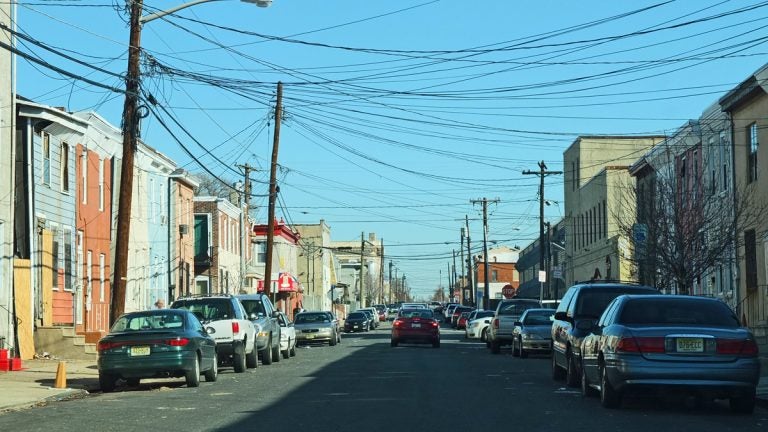Robert Wood Johnson Foundation promotes a ‘Culture of Health’ in Camden, NJ

Camden, NJ (Alan Tu/WHYY)
An army of nonprofits and government agencies has targeted Camden for rescue and revitalization, seeking to end its perennial ranking as the most dangerous city in America, create jobs, and improve the wellbeing of a population afflicted with high rates of unemployment and chronic health problems.
A reorganized police force, businesses drawn by state incentives, park renovations, new Little League teams, cutting-edge initiatives to house homeless people and fight drug addiction, meals for schoolchildren, and programs to encourage healthier eating are among the positive changes seen over the past decade, and particularly in the past three years.
That’s according to service providers and government officials who spoke during a conference yesterday at the city’s $90 million Kroc Corps Community Center, another new, privately funded asset that opened last year.
“What’s changed is that we have a number of nonprofit providers that are in the city,” Mayor Dana Redd said during a panel discussion. “Certainly I understand the importance of collaborating with the private sector and the nonprofit sector, because they do important work to transform the lives of children and their families. I’m not sure that that culture existed before.”
Yet the speakers at the event, a Culture of Health forum put on by the Robert Wood Johnson Foundation, also listed a number of complex and deeply ingrained problems that still need to be addressed, many of them tied to basic health and safety issues the Princeton-based foundation has sought to address by funding programs in Camden and around the state.
For example, while the city is home to three advanced hospitals, residents still have difficulty getting doctors’ appointments and use expensive emergency room care for minor health issues, said Dr. Jeffrey Brenner, CEO of the Camden Coalition of Healthcare Providers. A plague of childhood trauma, from homelessness, abuse, malnutrition, and crime, makes learning difficult and leads to stress-induced obesity and related health problems later in life, he said.
Camden-based Campbell Soup has sponsored a 10-year effort to encourage healthier eating, but getting fruits and vegetables into the corner bodegas where many residents shop does not guarantee people will actually buy them or that the stores can earn a profit, said Raymond Lamboy, president of the Latin American Economic Development Association.
The poor business climate and job market within the city are also major hindrances to residents’ success. Lamboy gave the example of a single mom who spends four hours a day on buses, taking her children to daycare and commuting to a job outside the city.
“Would this mother have the time to cook a healthy meal for her family? Maybe to go to the Kroc Center to work out? Or just enjoy a walk in the park?” he said. “I think we all agree that pervasive unemployment and deep poverty are two of the largest obstacles to creating this ‘culture of health’ we aspire to.”
And while the two-year-old countywide police force has halved the homicide rate compared to its peak in 2012, a fact Gov. Christie highlighted in his State of the State address this year, there were still 33 murders in 2014, the second-highest rate in the nation and just one less than in 2009.
Yesterday’s forum was the third on the Culture of Health concept that the Robert Wood Johnson Foundation has held, following events in Princeton and Jersey City last year. The initiative brings together people from a variety of medical, urban planning, community development, education, business, housing, transportation, and social service organizations to discuss ways to promote better health.
Much of the discussion focused on how to prevent medical problems from occurring in the first place through improved diet, exercise, and stress relief, and through prevention of crime and homelessness.
Anthony Perno, CEO of the Cooper’s Ferry Partnership, a nonprofit real estate developer, pointed to projects sponsored by his organization and others to create outdoor recreation spaces and trails that allow Camden residents to get out of their houses, enjoy nature, exercise, play sports, walk to transit centers and feel pride in their neighborhoods.
Such projects involve more than just fixing up parks, he said. Sponsors must engage residents to find out what activities they’re interested in, and educate them on how to use parks after years of avoiding blighted spaces that invited crime.
“What we found is, because those assets didn’t exist and because the crime in the city was so pervasive, sending your child out to a park to go run or go bike is a foreign concept in the city, because you’re not going to allow the most precious person in your life out of your sight,” he said.
After crime levels fell, residents were surveyed on potential recreation activities and said they were curious about yoga — though they knew little about it — and were interested in skateboarding and sewing. Outdoor yoga classes were organized, and one group sewed a large tablecloth and then held a picnic dinner, showing them parks could be safe even at night, Perno said.
Groups working to get residents outdoors also include the YMCA, which will be running structured activities at six parks this summer, and the Tri-State Transportation Campaign, which is helping develop a 750-miletrail circuit through Camden and other Philadelphia-area towns and pushing for better walking and biking amenities, representatives said.
Among the other organizations that described their health-related efforts in Camden was the Hispanic Family Center, whose executive director Elsa Candelario said the agency taught young Latinas, many of them recent immigrants, about the taboo subject of HIV prevention, and ran a pediatric asthma prevention program that cut emergency room visits by participants by 45 percent and reduced school absenteeism 60 percent.
Patricia Deshields, CEO of Project H.O.P.E., said her group provides healthcare, behavioral care, and drug treatment for homeless people at two sites and a mobile unit in Camden, and created a buprenorphine replacement therapy program (an alternative to methadone) to treat opioid addictions. Once a patient’s addiction is under control, it becomes possible to address their other chronic health issues, she said.
One of the conference’s striking anecdotes came from Paymon Rouhanifard, the city’s superintendent of schools. He said he recently rode on a school bus with some“displaced” students, who are living in hotels or couch-surfing while their families are otherwise homeless. One student said he napped on the bus every day, while another said she’d had a lunch of pizza, fries and rice. Three students were dropped off at a hotel, where he waited with them until their mother returned.
“Ultimately she arrived with four other children, and she walked her seven children into one motel room,” he said.
“Here at the school district in the city of Camden we’re confronted with a wide variety of physical, social, and emotional challenges with our students and families,” Rouhanifard said. “Needless to say, good health is fundamental to a good education, and students who are sick, or sleepy, or malnourished, or depressed, or being bullied, simply are unlikely to be unsuccessful in school.”
To address some of those problems, the district provides basic vision, dental, and medical services, as well as cooking classes and school gardens. All students get free breakfast and lunch and many receive a third meal after school. The meals are increasingly healthy and now include kale, he said, drawing laughter from the conference attendees.
_________________________________________________
NJ Spotlight, an independent online news service on issues critical to New Jersey, makes its in-depth reporting available to NewsWorks.
WHYY is your source for fact-based, in-depth journalism and information. As a nonprofit organization, we rely on financial support from readers like you. Please give today.




